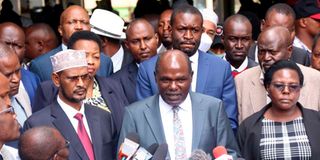Court suspends IEBC’s rule on gender principle

IEBC Chairman Wafula Chebukati addressing journalist at Anniversary Towers in Nairobi on April 26, after a meeting representatives of presidential candidates on the deadline for naming of running mates.
The High Court has suspended a decision by the electoral commission to compel political parties to comply with the two-thirds gender principle in their nomination of candidates for the August General Election.
Justice Anthony Ndung’u issued the temporary order yesterday, following a request by a Nairobi-based lawyer, Mr Adrian Kamotho, who is challenging the legality of the commission’s decision.
“I am persuaded that Mr Kamotho has made out an arguable case and a stay would be efficacious in the circumstances,” said Justice Ndung’u.
He added that the lawyer had demonstrated he has a strong case against the notice issued by the Independent Electoral and Boundaries Commission (IEBC) on April 27, 2022 threatening to blacklist candidates of political parties that will not comply with the gender rule.
Mr Kamotho, in a lawsuit filed yesterday, is challenging the decision of the electoral agency to impose the communal punishment on all candidates.
He argues that the directive issued by the IEBC is oppressive and pointless and its effort of enforcing the gender-parity rule is likely to be an effort in futility.
“The notice issued by the IEBC is discriminatory and prejudicial since it unfairly targets political parties while leaving out the independent candidates who stand an equal chance of winning the elective positions,” says the lawyer.
Deadline
According to the notice, the deadline of submitting a nomination list that complies with the gender rule is tomorrow (May 12, 2022).
Mr Kamotho states that the directive came when the political parties had generated lists of nominated persons based on the primaries conducted.
The directive of the IEBC was based on a court judgment delivered on April 20, 2017, requiring the commission to devise an administrative mechanism to ensure that the two-thirds gender principle was realised among political parties during nominations for parliamentary elections.
In Article 81, the Constitution of Kenya states that the electoral system will comply with the principle that not more than two-thirds of the members of elective public entities shall be of the same gender.
However, Mr Kamotho says IEBC has never developed the administrative mechanisms and it did not draw the said requirement to the political parties during the approval of the nomination rules for the 2022 elections.
“It is self-evident that the Office of Registrar of Political Parties, as well as the political parties, were never parties to the court case. Thus, IEBC was duty bound to bring the decision of the court to the attention of political parties, including those registered after the pronouncement of the said judgment,” says Mr Kamotho.
The lawyer wants court to quash the notice. He says the directive is draconian and unreasonable.
Approved by the electoral commission
He argues that the notice issued by IEBC is inherently incompatible with the gazetted election calendar published on January 20, 2022, since political parties have already concluded nominations in compliance with the law and in conformity with the election and nomination rules approved by the electoral commission.
He also accuses IEBC of failing to undertake public participation prior to the issuance of the directive, which is a mandatory requirement under Article 10 and 88(5) of the Constitution.
“Section 13 of the Elections Act, 2011 provides that a political party shall nominate its candidates for an election at least 90 days before a general election in accordance with its constitution and nomination rules. By directing political parties to nominate candidates outside the statutory timelines, the IEBC is driving political parties through the path of illegality,” he adds.
In his view, if not judicially redressed, the IEBC’s decision, which controversially seeks to lock out leading political parties from participation in the August 2022 General Election, could foment a ‘humongous political crisis’ in the country.
Among the political parties cited by IEBC as non-compliant are the Orange Democratic Movement (ODM), United Democratic Alliance (UDA), Amani National Congress (ANC), Wiper Democratic Movement, Narc and Narc-Kenya.





